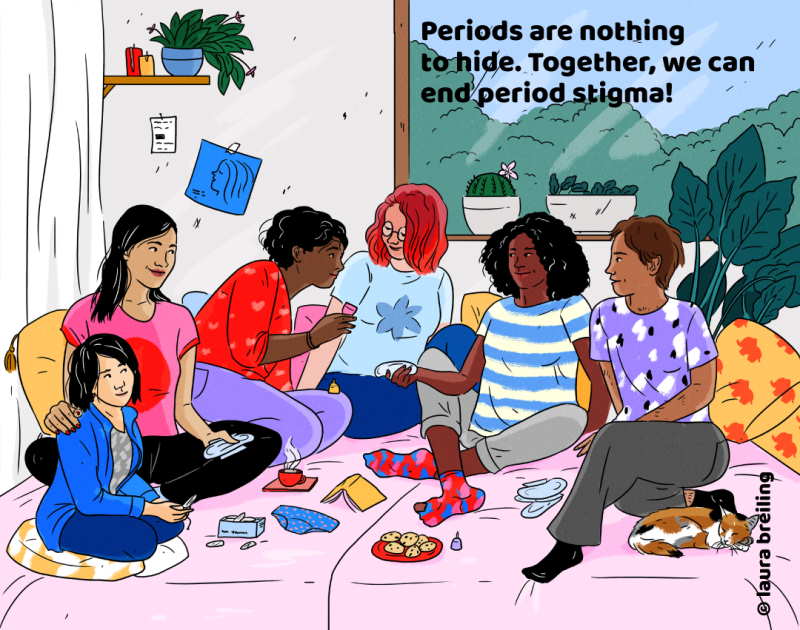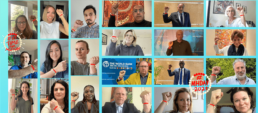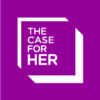Last year was the first time that Menstrual Hygiene Day was adapted into a digital format, and the potential for reaching a larger audience was undeniable. This year the Menstrual Health world was more prepared and came out in full force with just about every digital tool you can imagine to really show the globe that #ItsTimeForAction. Without geographic restrictions, a multitude of activities were carried out in the days and weeks around May 28th.

Pandora’s Box
Things really kicked off on our side when we sponsored a screening event of Pandora’s Box—the documentary film lifting the lid on menstrual inequity around the world. The film was made available for 24 hours through the generous support of Diva International before WASH United and Menstrual Hygiene Day hosted a fascinating discussion panel on May 18th. You can read more about the film and this special event in Cristina’s recap on our blog.

The Menstruation Bracelet
Whether it was painted on, virtually added, or rocked in a beaded version, the Menstruation Bracelet was everywhere this year! Created as a global symbol for menstruation, wearing the bracelet shows commitment to breaking the harmful stigmas and taboos surrounding menstruation.


Lighting up the World
Some countries even displayed their commitment to menstrual health by lighting important monuments up in the color red. Here we see Niagara Falls, Canada, and the National Congress of Argentina.


Symposiums and Events
Two excellent symposiums around menstrual health in Africa happened this year in the leadup to MH Day: The Virtual Symposium on Menstrual Health and Hygiene (MHH) in West and Central Africa (May 24–27), organized by UNICEF, UNFPA, and UNESCO, and the Africa Coalition Symposium on Menstrual Health (May 25–27) organized by the African Coalition for Menstrual Health Management and UNFPA.
At the Symposium in West and Central Africa, four main themes were discussed:
- The importance of a multi-sectoral approach to MHH programming
- Programmatic interventions, including understanding and identifying how to build effective and innovative programming models
- Financing and partnerships
- Research, monitoring, and evaluation
The guiding principles of the symposium included involving gender-transformative measures in MHH programs and engaging a diverse set of stakeholders ranging from governments to boys and men.
During the Africa Coalition Symposium on Menstrual Health, key supporters like the First Lady of Malawi, Monica Chakwera, and President of Ethiopia, Sahle-Work Zewde, spoke out about the importance of menstrual health for gender equality and human rights. menstruation was emphasized as a natural process that should not be silenced and stigmatized, and that comprehensive menstrual health must include access to affordable menstrual materials. Sustainability and affordability were discussed as the key drivers of innovation in menstrual health with a call for taking responsibility across sectors to ensure that every girl and woman can reach their full potential by guaranteeing this most basic of rights.
A highlight of the symposium was the launch of a technical brief titled The Integration of Menstrual Health into Sexual and Reproductive Health and Rights Policies and Programmes. This brief will help guide the integration of menstrual health into SRHR policies and programs across sectors.
A side event with a focus on menstruation in humanitarian settings at the World Health Assembly on May 28, drew representation from government officials, ambassadors, and prominent researchers in the area. Professor Marni Sommer shared her insightful framework on menstruation in emergencies and a number of speakers shared their own thoughts and interpretations of this framework from country-specific contexts.
Wrapping everything up on June 3rd: Studio MH Day! In a high-energy celebration, all of the incredible outreach we saw during this menstrual month was celebrated. Hosts Ina Jurga and Thorsten Kiefer invited speakers from across the globe to reflect on the success of their diverse initiatives. Guests included national coalitions, decision-makers, activists, researchers and funders who discussed education, period products, social norms, research, investment and more. You can still catch the full recording of Studio MH Day on the Menstrual Hygiene Day website.

If you are curious to learn more about the results from MH Day 2021, make sure to subscribe to the official newsletter because the team will be releasing those numbers soon. Subscribers are also the first to hear updates and news about the next campaign.
Overall Impressions
This year’s Menstrual Hygiene Day feels bigger and stronger than ever before, but there is still a long way to go when it comes to building a world where no one is held back just because they menstruate.
“On and around MH Day 2021, our movement of more than 800 partner organisations managed to raise awareness and increase the political relevance of menstrual health and hygiene like never before. But we’re not going to reach our joint 2030 goal of a world where no woman or girl is held back because she menstruates unless we manage to substantially increase investment in MHH asap. Translating increased awareness and political relevance into money on the table to fuel our collective action will be a key focus for MH Day starting in 2022.”
Thorsten Kiefer, Co-founder & CEO at WASH United
In her keynote address during Studio MH Day, MH expert Laura Amaya of Dalberg named The Case for Her as the largest funder that has openly committed to improving menstrual health. While we are proud to wear that title, we also second her follow-up question:
“Where are the others?”
There is no shortage of opportunities to finance menstrual health and improve the lives of half the population, both from a for-profit investor and a grant-making perspective. Our Menstruation Portfolio shows the benefits of both approaches. It spans the globe and includes investments in product companies, tech innovations, research initiatives, and grassroots organizations.

It’s clear to us: NOW IS THE TIME TO INVEST IN MENSTRUAL HEALTH AND HYGIENE!
- The Case for Her Teamhttps://thecaseforher.com/blog/author/tcfh-team/
- The Case for Her Teamhttps://thecaseforher.com/blog/author/tcfh-team/
- The Case for Her Teamhttps://thecaseforher.com/blog/author/tcfh-team/
- The Case for Her Teamhttps://thecaseforher.com/blog/author/tcfh-team/


